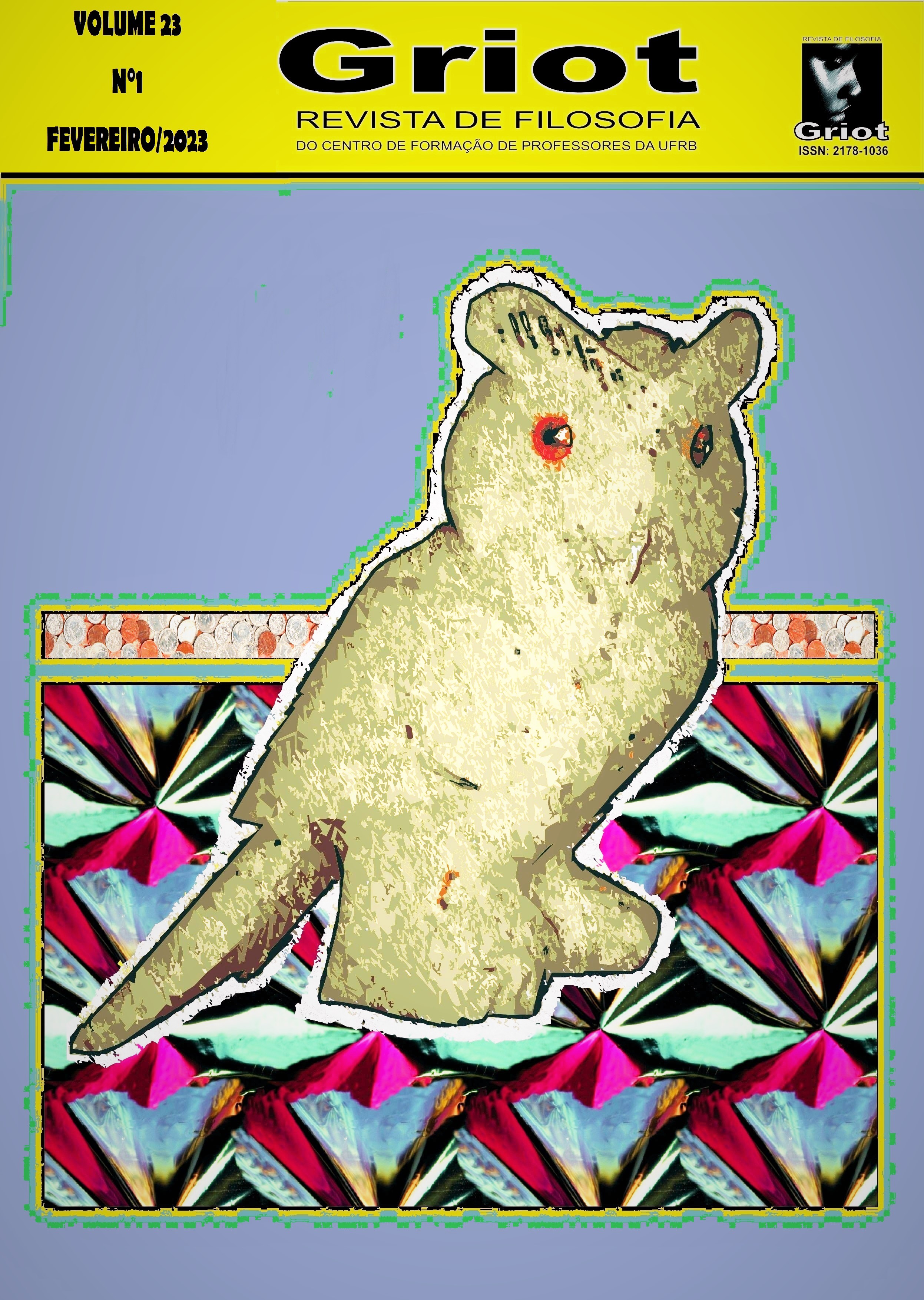Ludwig Wittgenstein’s philosophy in the light of the diagnosis of Autism
DOI:
https://doi.org/10.31977/grirfi.v23i1.3247Keywords:
Ludwig Wittgenstein; Autism; Literal understanding; Analogies.Abstract
Psychiatrists such as Michael Fitzgerald, Christopher Gillberg and Yoshiki Ishisaka diagnosed Ludwig Wittgenstein posthumously with Autism Spectrum Disorder (ASD). Taking this diagnosis into account, the present paper discusses how Wittgenstein's philosophy reveals his cognitive difficulties. Wittgenstein's grammatical inquiries are particularly investigated here, highlighting his misunderstandings concerning the use of words – specially, his misunderstandings concerning analogies, which he tended to interpret literally.
Downloads
References
Aristotle (1853). Organon, or Logical Treatises. London: Henry G. Bohn, York Street, Covent Garden.
Augustine (1955). Confessions. Philadelphia: Westminster Press.
Ayer, A. J. (1985). Ludwig Wittgenstein. London: Penguin Books.
Bouwsma, O. K. (1986). Wittgenstein: Conversations, 1949-1951. Indianapolis: Hackett Publishing Company.
Dilman, I. (2002). Wittgenstein's Copernican Revolution: The Question of Linguistic Idealism. Basingstoke: Palgrave Macmillan.
Drury, M. O'C. (1984a). Some notes on conversations with Wittgenstein. In: Rhees, Rush (Ed.). Recollections of Wittgenstein: Hermine Wittgenstein; Fania Pascal; F. R. Leavis; John King; M. O'c. Drury. Oxford: Oxford University Press, p. 76-96.
Drury, M. O'C. (1984b). Conversations with Wittgenstein. In: Rhees, Rush (Ed.). Recollections of Wittgenstein: Hermine Wittgenstein; Fania Pascal; F. R. Leavis; John King; M. O'C. Drury. Oxford: Oxford University Press, p. 97-171.
Edmonds, D.; Eidinow, J. (2001). Wittgenstein’s Poker: The Story of a Ten-Minute Argument between two Great Philosophers. New York: HarperCollins.
Fitzgerald, M. (2000). Did Ludwig Wittgenstein have Asperger's syndrome? European Child & Adolescent Psychiatry, 9: 61-65.
Fogelin, R. J. (1995). Wittgenstein. 2nd ed. London and New York: Routledge.
Frege, G. (1980). The Foundations of Arithmetic: A Logico-Mathematical Enquiry into the Concept of Number. New York: Harper & Brothers.
Gillberg, C. (2002). A Guide to Asperger Syndrome. Cambridge: Cambridge University Press.
Glock, H-J. (1996). A Wittgenstein Dictionary. Oxford: Blackwell.
Goldstein, R. (2005). Incompleteness: The Proof and Paradox of Kurt Gödel. London and New York: Atlas Books.
Hsiang, W. Y. (1995). A Concise Introduction to Calculus. London: World Scientific.
Ishisaka, Y. (2003a). Wittgenstein and Asperger Syndrome: I. Did Wittgenstein Have This Syndrome? Japanese Journal of Child and Adolescent Psychiatry, 44 (3): 231-251.
Ishisaka, Y. (2003b). Wittgenstein and Asperger Syndrome: II. Wittgenstein's Cognitive Styles. Japanese Journal of Child and Adolescent Psychiatry, 44 (3): 252-275.
Janik, A.; Toulmin, S. (1973). Wittgenstein's Vienna. New York: Touchstone.
Lakoff, G.; Jonhson, M (1999). Philosophy in the flesh: the embodied mind and its challenge to western thought. New York: Basic Books.
Leavis, F. R. (1984). Memories of Wittgenstein. In: Rhees, R. (Ed.). Recollections of Wittgenstein: Hermine Wittgenstein; Fania Pascal; F. R. Leavis; John King; M. O'C. Drury. Oxford: Oxford University Press, p. 50-67.
Malcolm, N. (2001). Wittgenstein: a Memoir. 2nd ed. Oxford: Clarendon.
McGuinness, B. (2002). Approaches to Wittgenstein: Collected Papers. London and New York: Routledge.
McGuinness, B. (2005). Young Ludwig: Wittgenstein's life, 1889-1921. Oxford: Clarendon Press.
McGuinness, B. (2012). Wittgenstein in Cambridge: Letters and Documents, 1911-1951. 4th ed. Oxford: Wiley-Blackwell.
McGuinness, B.; Von Wright, G. H. (Eds.) (1997). Ludwig Wittgenstein: Cambridge Letters – Correspondence with Russell, Keynes, Moore, Ramsey and Sraffa. Oxford and Malden: Blackwell Publishers.
Monk, R. (1990). Ludwig Wittgenstein: the duty of genius. New York: Penguin.
Pascal, F. (1984). Wittgenstein: a personal memoir. In: Rhees, R. (Ed.). Recollections of Wittgenstein: Hermine Wittgenstein; Fania Pascal; F. R. Leavis; John King; M. O'C. Drury. Oxford: Oxford University Press, p. 12-49.
Pinsent, D. (1990). A portrait of Wittgenstein as a young man: from the diary of David Hume Pinsent 1912-1914. Von Wright, G. H. (Ed.). Oxford: Blackwell.
Rhees, R. (Ed.) (1984). Recollections of Wittgenstein: Hermine Wittgenstein; Fania Pascal; F. R. Leavis; John King; M. O'C. Drury. Oxford: Oxford University Press.
Russell, B. (1998). Autobiography. London and New York: Routledge.
Russell, B. (1959). My Philosophical Development. London: George Allen & Unwin.
Russell, B. (1937). The Principles of Mathematics. Cambridge: Cambridge University Press. 2nd ed. London: George Allen and Unwin.
Snowdon, P. (2014). Private experience and sense data. In: Kuusela, O.; McGinn, M. (Eds.). The Oxford Handbook of Wittgenstein. Oxford: Oxford University Press, p. 402-428.
Strawson, P. F. (1992). Analysis and Metaphysics: An Introduction to Philosophy. Oxford: Oxford University Press.
Silva, G. A. F. (2023). A filosofia de Ludwig Wittgenstein à luz do diagnóstico de autismo (Ludwig Wittgenstein’s Philosophy in the Light of the Diagnosis of Autism). Forthcoming.
Waismann, F. (2003). Introduction to mathematical thinking: the formation of concepts in modern mathematics. Mineola: Dover Publications.
Williams, C.; Wright, B. (2004). How to Live with Autism and Asperger Syndrome: Practical Strategies for Parents and Professionals. London and Philadelphia: Jessica Kingsley Publishers.
Wittgenstein, L. (1984). Culture and Value. Chicago: Chicago University Press.
Wittgenstein, L. (1974). Philosophical Grammar. Berkeley: University of California Press.
Wittgenstein, L. (2009). Philosophical Investigations. 4th ed. Malden and Oxford: Blackwell.
Wittgenstein, L. (2003). Public and private occasions. Klagge, J. C.; Nordmann, A. (Eds.). Lanham; Boulder; New York; Oxford: Rowman & Littlefield Publishers.
Wittgenstein, L. (1978). Remarks on the Foundations of Mathematics. Oxford: Blackwell.
Wittgenstein, L. (1965). The Blue and Brown Books. New York: Harper Torchbooks.
Wittgenstein, L. (2005). The Big Typescript: TS 213. Oxford: Blackwell Publishing.
Wittgenstein, L. (2001). Wittgenstein's lectures: Cambridge, 1932-1935. Ambrose, Alice; Macdonald, Margaret (Eds.). Amherst, N.Y.: Prometheus Books.
Wittgenstein, L. (1989). Wittgenstein's Lectures on the Foundations of Mathematics. Cambridge, 1939: from the notes of R. G. Bosanquet, Norman Malcolm, Rush Rhees, and Yorick Smythies. Diamond, Cora (Ed.). Chicago and London: The University of Chicago Press.
Wittgenstein, L. (1970). Zettel. Berkeley: University of California Press.
Wittgenstein, L.; Waismann, F. (2003). The voices of Wittgenstein: The Vienna Circle – Ludwig Wittgenstein and Friedrich Waismann. Baker, Gordon (Ed.). London: Routledge.
Downloads
Published
How to Cite
Issue
Section
License
Copyright (c) 2023 Gustavo Augusto Fonseca Silva

This work is licensed under a Creative Commons Attribution 4.0 International License.
The authors who publish in Griot: Revista de Filosofia maintain the copyright and grant the magazine the right of first publication, with the work simultaneously licensed under the Creative Commons Attribution 4.0 International License, allowing sharing and adaptation, even for commercial purposes, with due recognition of authorship and initial publication in this journal. Read more...









































































